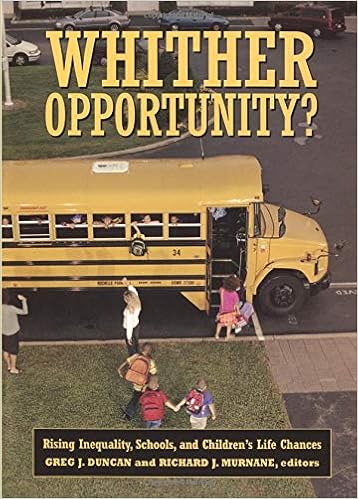
One does not often apply the term landmark to an edited volume, but this volume is a major exception to the rule. Whither Opportunity? is one of the most important compendia we have, for it examines in detail and from all conceivable angles the power of class to determine the developmental fate of America s children. From this volume, we learn that children in communities experiencing unemployment do worse in school even if their own families are safe from its reach; that test score gaps by income are larger and growing faster than the gaps between black and white; that expenditures by high-income families on enrichment of all kinds is vastly larger than what low-income families can afford. All of this adds up to a new and troubling examination of the ways in which income inequality is pressing the nation s children, youth, neighborhoods, schools, and families. I don t often use the overworked phrase, must read, but it most definitely applies to this book.
As the incomes of affluent and poor families have diverged over the past three decades, so too has the educational performance of their children. But how exactly do the forces of rising inequality affect the educational attainment and life chances of low-income children? In Whither Opportunity? a distinguished team of economists, sociologists, and experts in social and education policy examines the corrosive effects of unequal family resources, disadvantaged neighborhoods, insecure labor markets, and worsening school conditions on K-12 education. This groundbreaking book illuminates the ways rising inequality is undermining one of the most important goals of public education―the ability of schools to provide children with an equal chance at academic and economic success. The most ambitious study of educational inequality to date, Whither Opportunity? analyzes how social and economic conditions surrounding schools affect school performance and children’s educational achievement. The book shows that from earliest childhood, parental investments in children’s learning affect reading, math, and other attainments later in life. Contributor Meredith Phillip finds that between birth and age six, wealthier children will have spent as many as 1,300 more hours than poor children on child enrichment activities such as music lessons, travel, and summer camp. Greg Duncan, George Farkas, and Katherine Magnuson demonstrate that a child from a poor family is two to four times as likely as a child from an affluent family to have classmates with low skills and behavior problems – attributes which have a negative effect on the learning of their fellow students. As a result of such disparities, contributor Sean Reardon finds that the gap between rich and poor children’s math and reading achievement scores is now much larger than it was fifty years ago. And such income-based gaps persist across the school years, as Martha Bailey and Sue Dynarski document in their chapter on the growing income-based gap in college completion. Whither Opportunity? also reveals the profound impact of environmental factors on children’s educational progress and schools’ functioning. Elizabeth Ananat, Anna Gassman-Pines, and Christina Gibson-Davis show that local job losses such as those caused by plant closings can lower the test scores of students with low socioeconomic status, even students whose parents have not lost their jobs. They find that community-wide stress is most likely the culprit. Analyzing the math achievement of elementary school children, Stephen Raudenbush, Marshall Jean, and Emily Art find that students learn less if they attend schools with high student turnover during the school year – a common occurrence in poor schools. And David Kirk and Robert Sampson show that teacher commitment, parental involvement, and student achievement in schools in high-crime neighborhoods all tend to be low. For generations of Americans, public education provided the springboard to upward mobility. This pioneering volume casts a stark light on the ways rising inequality may now be compromising schools’ functioning, and with it the promise of equal opportunity in America.
Almost all Americans state that they are in favor of equal opportunity for the next generation. But the lip service stops there. Whither Opportunity? systematically and forcefully follows low- and high-income children through the life course from birth through their labor-market outcomes. The authors suggest that at every stage in the life course low-income children have worse outcomes than do higher-income children, leading to a highly polarized future society. The myriad of studies summarized here offer compelling evidence that if we as a nation really believe in equality of opportunity, we must intervene early and often in low-income children s lives and in the schools they attend, while also addressing the rising inequality that is ultimately giving well-to-do children every advantage possible and harming low-income children. This book will be a reference source on child development, inequality, and schools for years to come. I urge you to read it and then become active in social change to better the situation of low- income children in America.
Greg J. Duncan is distinguished professor in the Department of Education at the University of California, Irvine. Richard J. Murnane is Thompson Professor of Education and Society at the Harvard Graduate School of Education.
No comments:
Post a Comment